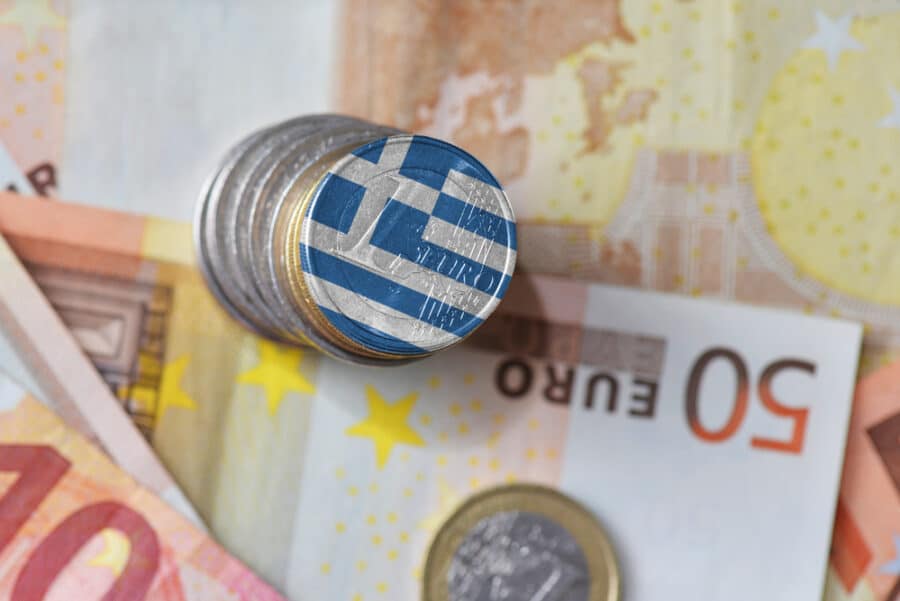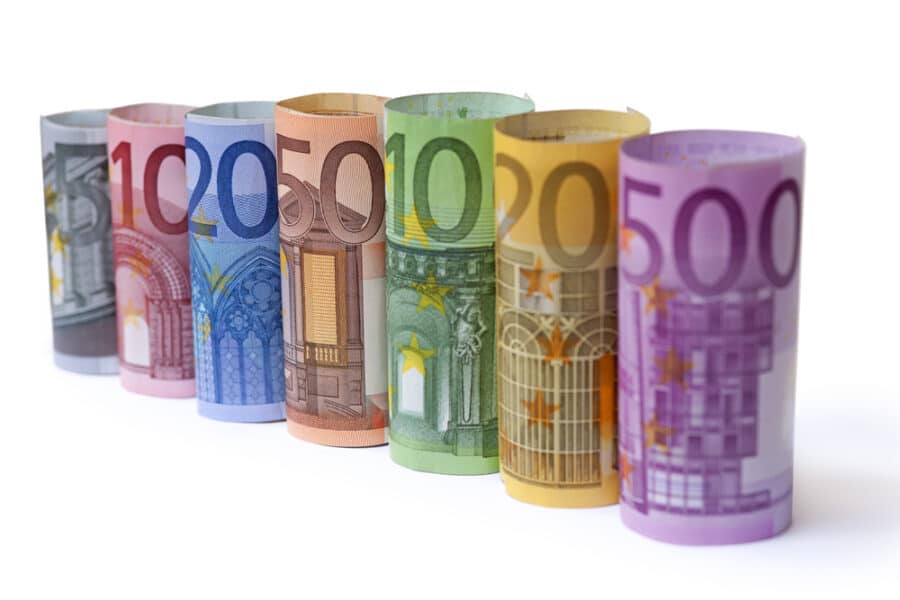Here is your guide on what currency is used in Greece. From euros to credit cards and ATMs, we’ve got you covered on everything related to money in Greece.

Welcome to Greece, the land of the Acropolis, ancient history, rich culture, and picturesque landscapes! As you gear up for your Greek adventure, have you wondered, “What is the currency in Greece?”
If so, this guide will be essential to familiarize yourself with Greece’s currency.
With several payment options available in Greece, like Visa and Mastercard (some places accept American Express and Diners Club), choosing the right one can sometimes be confusing. But don’t worry – our comprehensive guide will help you navigate all the currency options like a pro. From euros to credit cards and ATMs, we’ve got you covered on everything related to money in Greece.
So please sit back and let us take you on an exciting journey of discovery as we explore what currency to use while traveling in Greece!
Skip Ahead To My Advice Here!
Overview Official Currency In Greece
Greece is a member of the European Union, and since Greece joined the eurozone in 2001, the euro has been the official currency.
The euro symbol is (€), and you will see it either before or after the price. Before that, the Greek Drachma (GRD) was used. Although the euro is the national currency in Greece, some businesses may show items priced in USD to attract tourists.
What Is The Euro Currency – Euro Currency Exchange

The euro is the local currency in Greece and 20 other European countries. It was introduced in January 2002, replacing the Greek drachma. Greece is a eurozone (EZ) member, meaning it uses the euro as its sole currency.
Tourists visiting Greece should be aware that prices are typically quoted in euros. Many businesses will accept payment in other currencies but often do so at an unfavorable exchange rate. Having some euros on hand is always best to avoid any problems.
ATMs are widely available throughout Greece and are the best way to get euros quickly. Credit cards can also be used for purchases, but visitors should know that some smaller businesses may not accept them.
Traveler’s checks (aka Travellers’ cheques) can be cashed at banks, but they are not as widely accepted in Greece as they once were, so we suggest you leave them at home. Personal checks are not accepted.
Brands We Use And Trust
What Denominations Of Euro Does Greece Use

There are seven denominations of euro coins: 1, 2, 5, 10, 20, and 50-cent coins, as well as 1 and 2 euro coins. Greece also uses euro banknotes, which come in denominations of 5, 10, 20, 50, 100, 200, and 500 euros.
Greek Banks
Many different banks in Greece will accept your foreign card. The four largest banks in Greece are the following
- National Bank of Greece
- Alpha Bank
- Eurobank
- Piraeus Bank
These banks have ATMs accepting foreign cards and offering international money transfers. They also provide a variety of other services, such as online banking and mobile banking. Many smaller regional banks in Greece may be more convenient for you, depending on your location. Major cities and islands in Greece have no shortage of ATMs, so do not worry about that.
Should You Use ATMs In Greece
If you are traveling to Greece, you may wonder if using ATMs is safe. The answer is yes; it is safe to use ATMs in Greece to withdraw money; I do it all of the time.
However, there are a few things to remember when using them:
- First, make sure that the ATM is in a well-lit and safe area
- Second, only use ATMs that are affiliated with a bank or credit card company to avoid hidden fees. In tourist areas, you will find ATMs like Euronet & Moneybox; avoid them at all times
- Third, be aware of your surroundings and protect your PIN when entering it into the machine
- Fourth, check your bank account statements regularly to ensure no unauthorized withdrawals. If you notice any suspicious activity on your account, immediately report it to your bank.
Overall, using an ATM in Greece is safe if you take precautions and use common sense as you would when traveling to any country (or even your home country!).
Can You Use USD On Your Trip To Greece

Yes, you can use USD in Greece in some places, as sellers will hardly refuse a sale, but it is not the preferred Greek currency. The euro is the official currency of Greece and is the best currency to use when traveling to Greece.
Even though you can sometimes pay with US Dollars (or the British Pound), you will get an appalling exchange rate if you use them because it is not legal tender.

Cash Vs. Credit & Bank Card In Greece – Which Is Best
There are a few things to consider when deciding whether to use cash or credit cards abroad. The first consideration is whether the visiting country, like Greece, has ATM access for Visa or MasterCard and a reliable banking infrastructure. Greece has both, so using a credit card isn’t an issue.
The second thing to consider is what kind of traveler you are. If you like to keep track of your spending and budget carefully, using a credit card can be an excellent way to do that. Your credit card statement lets you easily see how much you’ve spent in a day, week, or month.
If you’re the type of traveler who likes to splurge occasionally or doesn’t want to worry about carrying around a lot of cash, using a credit card can be a good option. Just be sure to pay off your balance in full each month so you don’t get hit with high-interest rates.
In general, both cash and credit cards have their pros and cons when traveling abroad. It depends on your preferences as to which is best for you.
Money In Greece – Cash, Cash Mooooooney

Greece is essentially a cash society, and though you will be able to use your cards in all the big cities and touristy sites, you should be aware that international credit and debit cards often charge overseas transaction fees for EACH transaction. These charges can quickly add up.
In more regional areas, it might not even be easy to find service without cash, or if you grab a coffee, you should pay cash and not charge it.
The biggest reason to use money in Greece is to bargain! You’ll get better prices when doing your souvenir shopping.
Tips For Taking Your Credit Card Abroad
- When using your credit card abroad, be sure to inform your bank or credit card company of your travel plans. This will help them identify any unusual activity on your account and avoid potential issues. Thus, it’s beneficial to inform them about your Greece visit to keep your Visa or MasterCard active.
- Be aware of the exchange rate when using your credit card abroad. This will help you to budget for your expenses and avoid any unexpected charges on your statement
- Use a credit card that has no foreign transaction fees. This will save you money on every purchase that you make while abroad
- Pay off your credit card balance in full each month to avoid paying interest on your purchases
- Keep track of all of your expenses while abroad so that you can stay within your budget
FAQs
What is the official currency in Greece?
Greece’s currency is the euro (€), which you can check on this currency converter. Greece adopted the euro as its official currency on 1 January 2001. However, euro banknotes and coins were introduced in Greece on 1 January 2002. The euro replaced the Greek drachma.
What are the denominations of the euro?
Euro banknotes are in denominations of 5, 10, 20, 50, 100, 200, and 500. There are also 1 and 2 euro coins, as well as cents in coins of 1, 2, 5, 10, 20, and 50.
Where should I avoid changing money in Greece?
It is recommended to avoid changing money at airports or hotels due to their typically high fees.
Should I choose to be charged in local currency when using ATMs in Greece?
Yes, always choose to be charged in the local currency to cut your costs and get the best rates available.
Can I use my credit, debit, or bank card in Greece?
Yes, credit and debit cards are widely accepted in Greek cities, but it’s recommended to have cash when you’re in rural areas.
How widely available are ATMs in Greece?
ATMs are commonplace in Greek cities. However, their availability decreases in more rural regions and on the Greek islands.
What currency does Greece use?
Euros.
Does Greece use the euro?
Yes, and it has been done since 2002.
What money do they use in Greece?
Euros.
What is the best exchange rate for Greece?
The exchange rate changes all of the time. It is best to confirm close to your trip departure on www.xe.com to get an idea of what the best exchange rates you can accept are.
Should I carry money in Greece?
Yes. As with all travel, it is best to carry as much cash as possible in case of emergencies. Cash is king for places like street vendors and quick drink stops.
Does Greece use the euro?
It sure does.
Can I exchange dollars for euros on the islands?
You can. But, money exchange booths can be harder to find on the smaller Greek islands, so change them in Athens if you have time.
Move This Adventure To Your Inbox & Get An Instant Freebie

No spam. Unsubscribe at any time.
Money Used In Greece Conclusion
Remember, the euro is the official currency of Greece. Bank debit cards, prepaid travel cards, and major credit cards are widely accepted in stores, restaurants, and hotels nationwide.
So, that is it; now you know what the currency of Greece is – after all, it is important to know what currency in Greece to use while traveling in Greece to make sure you are prepared.

